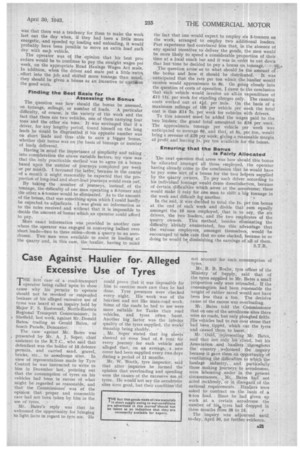Case Against Haulier for Alleged Excessive Use of Tyres
Page 23

If you've noticed an error in this article please click here to report it so we can fix it.
THE first case of a road-transport operator being called -upon to show cause why his permits to operate should not be revoked or suspended because of his alleged excessive use of tyres was heard at an inquiry held by Major F. S. Eastwood, North-Eastern Regional Transport Commissioner, in Sheffield, last week, against Mr. Donald Bates., trading as Gerald Bates, of South Parade, Doncaster.
The case against Mr. Bates was presented by Mr. A. J. Soper, chief assistant .to the R.T.C., who said that defendant was the holder of 15 defence permits, and carried sand, gravel, bricks, etc.. to aerodrome sites. In view of representations made by Tyre Control he was instructed to write to him in December last, pointing out that the consumption of tyres on his vehicles had been in excess of what might be regarded as reasonable, and that the Commissioner was of the opinion that proper and reasonable care had not been taken by him in the use of tyres. •
Mr. Bates's reply was that lie welcomed the opportunity for bringing to light facts in regard to tyre use. He
could prove that it was impossible for him to exercise more care than he had done. Tyre pressures were checked every night. His work was of the heaviest and not like main-road work, Some of the roads he had to use were more suitable for Tanks than road vehicles, and tyres often burst. Another big factor wasthe inferior quality of the tyres supplied, the work= manship being shoddy. • Mr. Soper stated that log sheets showed an even load of ,6 tons' for every journey for each vehicle and alleged that, on an average, a new cover had been supplied every two days during a period of 11 months.
Mr. W. 'Booth, tyre inspector, said that after inquiries he formed the' opinion that overloading and speeding were the causesof the excessive use. of tyres. He would not say the aerodrome sites vere good, but their condition 'did not account for such consumption of tyres.
Mr. R. B. Roche, tyre officer of the Ministry of Supply, said that of the tyres supplied to Mr. Bates a small proportion only were retreaded. If the consumntion had been reasonable the weight of rubber saved would not have been less than a ton. The decisive cause of the excess was overloading.
Mr. Bates told the Commissioner that on one of the aerodrome sites there were no roads, but only ploughed fields. His vehicles had to run over stone that had been tipped, which cut the tyres and caused them to burst.
Mr. Ould; rePresenting Mr. Bates, said that not only his client, but his Association and -hauliers .throughout the country welcomed the inquiry because it gave them an opportunity ol ventilating the difficulties to which the haulage industry, and particularly those making journeys to aerodromes, were labouring under in the present circumstances'. _ Mr. Bates had not acted recklessly, or in disregard of the national requirements. HauberS were asked to contract on the basis of a 6-ton load. Since he had given up work at a certain aerodrome the number of hi. tyres had dropped in three months titan 38 to 15.
The inquiry was adjourned until to-day, April 30, for further evidence.




















































